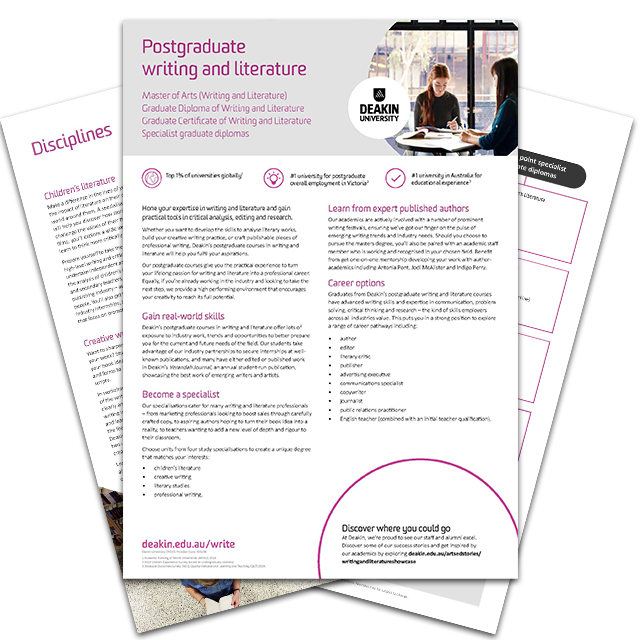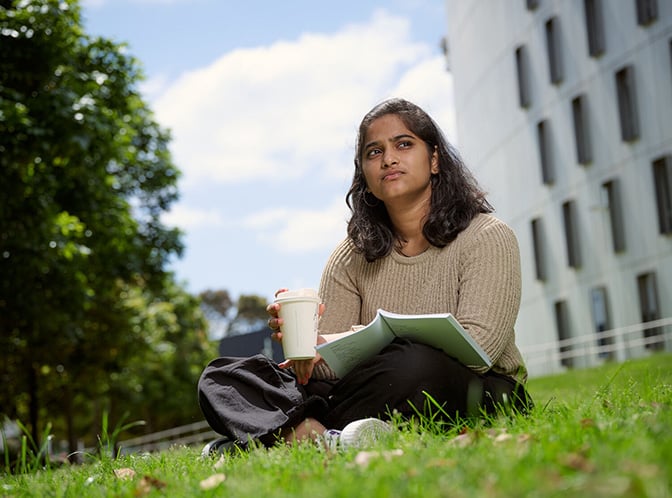Key facts
Duration
1-2 years full time or part time equivalent depending on your entry point
Locations
Key dates
Direct applications to Deakin for Trimester 2 2025 close 22 June 2025
Direct applications to Deakin for Trimester 3 2025 close 26 October 2025
Current Deakin Students
To access your official course details for the year you started your degree, please visit the handbook
Course overview
The Master of Arts (Writing and Literature) gives candidates the opportunity to undertake advanced study in the disciplines of Writing and Literature. Students undertake both relevant coursework to their specialisation and a substantial research project (thesis) under the supervision of an academic with a professional research record.
The Master of Arts (Writing and Literature) offers study in a unique combination of literary, professional and creative writing options, together with the possibility for cross-disciplinary explorations. Students can choose between specialisations in the areas of Children's Literature, Creative Writing, Literary Studies and Professional Writing. Students are paired with an academic or professional staff member working – and nationally recognised – in their specialist field. This partnership provides students with mentoring through the extended research project (thesis), which is one of the highlights of this course. The unique research pathway in the Master of Arts (Writing and Literature) provides candidates with a new level of intellectual stimulation and personal enrichment and gives them the opportunity to contribute to a wider debate within their field, often through publication. The research training and skills acquired in this course enhance students’ future career prospects in a broad range of occupations and ensures they are eligible to apply for entry to higher research programs.
Read MoreCourse information
- Award granted
- Master of Arts (Writing and Literature)
- Year
- 2018 course information
- Deakin code
- A764
- Level
- Higher Degree Coursework (Masters and Doctorates)
- Approval status
- This course is approved by the University under the Higher Education Standards Framework.
- Australian Qualifications Framework (AQF) recognition
The award conferred upon completion is recognised in the Australian Qualifications Framework at Level 9.
Course structure
To qualify for the Master of Arts (Writing and Literature), a student must successfully complete 16 credit points of study comprising:
- AAI018 Academic Integrity (0-credit-point compulsory unit)
- 6 credit points of study in either of the following configurations:
- 6 credit points from one of the specialisation options (Children's Literature, Creative Writing, Literary Studies, Professional Writing); or
- 6 credit points of cross-disciplinary study comprising ALW740, ALL743, 2 credit points of Literature units (Children's Literature and/or Literary Studies), and 2 credit points of units of Writing units (Creative Writing and/or Professional Writing)
- 7 credit points of core units
- 3 credit points of elective units
Core units
Electives
Electives are to be chosen from units in the specialisations of the Master of Arts (Writing and Literature) or Master of Communication.
Note: The internship unit
Units
Either;
6 credit points from one of the specialisation options (Children's Literature, Creative Writing, Literary Studies, Professional Writing)
Or
6 credit points of crossdisciplinary study comprising of -
Plus 2 credit points of Literature units (Children's Literature and/or Literary Studies)
Plus 2 credit points of Writing units (Creative Writing and/or Professional Writing)
Electives are to be chosen from units in the specialisations of the Master of Arts (Writing and Literature) or Master of Communication.
Note: The internship unit
Specialisations
Intakes by location
The availability of a course varies across locations and intakes. This means that a course offered in Trimester 1 may not be offered in the same location for Trimester 2 or 3. Check each intake for up-to-date information on when and where you can commence your studies.
Trimester 1 - March
- Start date: March
- Available at:
- Burwood (Melbourne)
- Cloud Campus
Trimester 2 - July
- Start date: July
- Available at:
- Burwood (Melbourne)
- Cloud Campus
Trimester 3 - November
- Start date: November
- Available at:
- Burwood (Melbourne)
- Cloud Campus
Other course information
Course duration - additional information
Course duration may be affected by delays in completing course requirements, such as accessing or completing work placements.
Mandatory student checks
Any unit which contains work integrated learning, a community placement or interaction with the community may require a police check, Working with Children Check or other check.
Participation requirements
Reasonable adjustments to participation and other course requirements will be made for students with a disability. Click here for more information.
Work experience
Elective units may provide the opportunity for Work Integrated Learning experiences.

Take the next step to a brighter future
Kickstart your career growth. We'll prepare you for the career you've always wanted.
Download course guideEntry requirements
Recognition of prior learning
The University aims to provide students with as much credit as possible for approved prior study or informal learning which exceeds the normal entrance requirements for the course and is within the constraints of the course regulations. Students are required to complete a minimum of one-third of the course at Deakin University, or four credit points, whichever is the greater. In the case of certificates, including graduate certificates, a minimum of two credit points within the course must be completed at Deakin.
You can also refer to the Credit for Prior Learning System which outlines the credit that may be granted towards a Deakin University degree and how to apply for credit.
Fees and scholarships
Fee information
Learn more about fees and your options for paying.
The available fee places for this course are detailed above.
Tuition fees are determined by your enrolment:
- If you are offered a full fee paying place, your tuition fees are calculated based on your course.
- If you are offered a Commonwealth supported place, your tuition fees are calculated depending on the units you choose. Not all courses at Deakin have Commonwealth supported places available.
The 'Estimated tuition fee' is provided as a guide only based on a typical enrolment of students completing the first year of this course. The cost will vary depending on the units you choose, your study load, the length of your course and any approved Credit for Prior Learning.
* One year full-time study load is typically represented by eight credit points of study. Each unit you enrol in has a credit point value. The 'Estimated tuition fee' is calculated by adding together 8 credit points of a typical combination of units for your course.
You can find the credit point value of each unit under the Unit Description by searching for the unit in the Handbook.
Learn more about fees and available payment options.
FEE-HELP
You may be eligible for the Government's FEE-HELP scheme. This scheme covers your tuition fees and can help make studying significantly more affordable.
It's similar to HECS-HELP, but designed for full-fee place courses. It doesn't matter how much you earn, you may still be eligible for FEE-HELP.
Scholarship options
A Deakin scholarship might change your life. If you've got something special to offer Deakin – or you just need the financial help to get you here – we may have a scholarship opportunity for you.
Postgraduate bursary
If you’re a Deakin alumnus commencing a postgraduate award course, you may be eligible to receive a 10% reduction per unit on your enrolment fees.
Apply now
To apply, create an account in the Deakin Application Portal, enter your personal details and education experience, upload supporting documents and submit. Need help? Play this video, or contact one of our friendly future student advisers on 1800 693 888 or submit an online enquiry.
For more information on the application process and closing dates, see the How to apply webpage. If you're still having problems, please contact us for assistance.
Research Information
Students will undertake 7 credit points of research units consisting of research methods, theory and research-based project units where they will be required to complete a thesis comprising a creative production AND exegesis of 8000 words OR a written dissertation of 18000-20000 words.
Pathways
Alternative exits
Contact information
Arts and Education Student Services and Enrolment Enquiries
Burwood (Melbourne)
Tel 03 9246 8100
artsed@deakin.edu.au
Cloud (online)
Tel 03 5227 1359
artsed@deakin.edu.au
Careers
Career outcomes
This course is designed to broaden the skills of those working as teachers, librarians and writers, as well as professionals working in associated fields such as publishing and promotion. The course is also suitable if you are seeking a qualification to refocus your career options.
For more information go to My Course My Career
Course learning outcomes
Deakin's graduate learning outcomes describe the knowledge and capabilities graduates can demonstrate at the completion of their course. These outcomes mean that regardless of the Deakin course you undertake, you can rest assured your degree will teach you the skills and professional attributes that employers value. They'll set you up to learn and work effectively in the future.
| Deakin Graduate Learning Outcomes | Course Learning Outcomes |
| Discipline specific knowledge and capabilities | Acquire an integrated knowledge of a range of relevant writing and literature theories, concepts, and approaches to the critical analysis, creation and/or production of texts. Acquire advanced understanding of the cultural, historical, professional and/or stylistic differences and contexts of the domains of writing and literature, which include Creative Writing, Children’s Literature, Professional Writing and/or Literary Studies. |
| Communication | Demonstrate specialised command of the technical and aesthetic elements of different forms of writing, including proficient use of critical, theoretical and professional vocabularies and language to create, define, interpret, argue and fluently transmit ideas in scholarly, professional and/or creative texts produced for a variety of audiences and contexts. |
| Digital literacy | Master generic, academic, bibliographic and industry-specific digital communication technologies to research, produce and present scholarly and creative works. Use judgement and discrimination in the identification and selection of relevant and credible information sources and with regard for their ethical use. |
| Critical thinking | Produce creative and critical works which address complex issues and ideas with rigor in the conduct of supporting research and presentation of evidence; Use mature critical judgment in the synthesis and application of theory; and mastery of the critical, technical and creative skills required to generate and evaluate texts produced by self and others. |
| Problem solving | Employ expert knowledge and skills in the use of specialist theoretical, historical and contemporary analytical and creative approaches to writing and literature that is reflected in the design and execution of creative and scholarly solutions to a range of technical, professional, aesthetic, critical and/or ideological problems. |
| Self-management | Demonstrate high-level initiative and independence, responsibility, accountability and a continued commitment to learning and skill development in writing and literature and as a reflective learner and practitioner in scholarly, industry and/or professional contexts. |
| Teamwork | Demonstrate commitment to ethical and collaborative participation in scholarly, learning and/or industry settings and active contribution to the accomplishment of mutual learning and professional goals. |
| Global citizenship | Develop and informed knowledge of the ethics of writing and interpreting textual representations of diverse groups, and insight into the influence of changing social, cultural and ideological factors on the production and consumption of creative, critical and professional texts. Use the highest standards of ethical conduct and social responsibility when engaging in scholarly, creative and/or professional practice in the local, national and international community. |
| Approved by Faculty Board October 2015 | |
Events Explore more events
Footnotes
++Some courses have limited places, apply early to avoid missing out.




